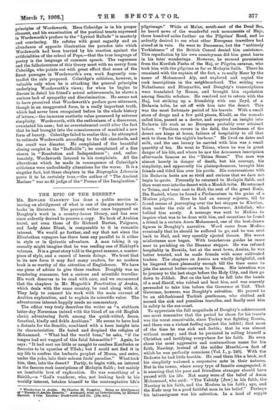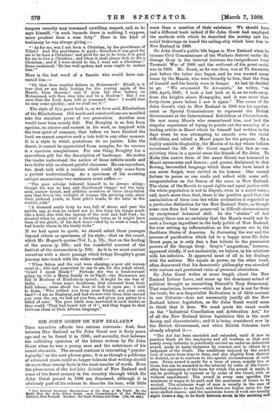THE EPIC OF THE DESERT.*
Mn. EDWARD GARNETT has done a public service in issuing an abridgment of what is one of the greatest travel- books "in literature. The present writer once happened on Doughty's work in a country-house library, and has ever since ardently desired to possess a copy. No book of Arabian travel, not even those of Sir Richard Burton, Palgrave, and Lady Anne Blunt, is comparable to it in romantic interest. We would go further, and say that not since the Elizabethan voyagers has there been any parallel to it either in style or in Quixotic adventure. A man taking it up casually might imagine that he was reading one of Hakluyt's volumes. Itis a great story told in the great manner, a master- piece of style, and a record of heroic doings. We trust that in its new form it may find many readers, for no modern book is so worthy of the attention of Englishmen. We have one piece of advice to give these readers. Doughty was no wandering romancer, but a serious and scientific traveller. His work deserves to be read with care, and we recommend that the chapters in Mr. Hogarth's Penetration of Arabia, which deals with the same country, be read along with it. They help to connect his work with the main current of Arabian exploration, and to explain its scientific value. The adventurous interest happily needs no commentary.
The editor very truly describes the writer as "a stubborn latter-day Norseman (mixed with the blood of an old English cleric) adventuring forth among the quick-witted, fierce, fanatical, kindly and fickle Arabians." He seems to have had a distaste for the Semitic, combined with a keen insight into its characteristics. He hated and despised the religion of Mohammed. "What had the world been," he asks, "if the tongue had not wagged of this fatal Ishmaelite P " Again, he says : "It had cost me little or naught to confess Konfuchn or Socrates to be apostles of Mesh; but I could not find it in my life to confess the barbaric prophet of Mecca, and enter, under the yoke, into their solemn fools' paradise." What took him, then, into the desert P Partly, to begin with, an interest in the famous rock inscriptions of Medayin Salih; but mainly an insatiable love of exploration. He was something of a Siiiehh,—a " God's wanderer, who, not looking back to his worldly interest, betakes himself to the contemplative life's
• Wanderings in Arabia. By Charles M. Doughty. Being an Abridgment of " Trawls in Arabia Deserts." Arranged, with an Introduction, by Edward Garnett. 2 vols. London; Duckworth and Co. [16s, net.]
pilgrimage." While at Ma'an, south-east of the Dead Sea, he heard news of the wonderful rock monuments of Hejr, three hundred miles further on the Pilgrims' Road, and he ardently desired to see what other European travellers had aimed at in vain. He went be Damson's, but the "untimely Turkishness " of the British Consul denied him assistance. This repudiation by his own countryman did him great harm in his later wanderings. However, he secured permission from the Kurdish Pasha of the Haj, or Pilgrim caravan, who took him with the pilgrims as far as Medaybr Salih. There he remained with the captain of the fort, a rascally Moor by the name of Mohammed Aly, and explored and copied the rock inscriptions in the neighbourhood. The writing was Nabatbaean and Himyaritic, and Doughty's transcriptions were translated by Renan, and brought him reputation among Semitic scholars. He resolved not to return with the Haj, but striking up a friendship with one Zeyd, of a Bedawin tribe, he set off with him into the desert. This was the most fortunate period of his travels. With a small store of drugs and a few gold pieces, Khalil, as the nomads called him, passed as a doctor, and acquired an insight into Bedawin life such as no European probably ever attained before. " Perilous rovers in the field, the herdsmen of the desert are kings at home, fathers of hospitality to all that seek to them for the night's harbour." He lived on dates and milk, and the one luxury he carried with him was a small quantity of tea. He went to Teima, where he was in great danger of his life, and where he saw the Aramaean inscription afterwards famous as the "Teima Stone." The man was almost hourly in danger of death, but his courage, his simplicity, and apparently his plainspokenness, brought him friends and tided him over his perils. His conversations with his Bedawin hosts are so vivid and curious that we dare not begin to quote. Presently he returned to Medayin Salih, and then went west into the desert with a Moahib tribe. He returned to Teima, and went east to Hail, the seat of the great Emir, Ibn Rashid, where he found a Piedmontese in the guise of a Moslem pilgrim. Here he had an uneasy sojourn, till he found means of journeying over the hot steppes to Kheibar, then under the rule of a black Governor, Abdullah, who bullied him sorely. A message was sent to Medina to inquire what was to be done with him, and meantime he found a friend in a certain Amm Mohammed, one of the best-drawn figures in Doughty's narrative. Word came from Medina. eventually that he should be suffered to go, and he was sent back to Hail, and very speedily ejected thence. His worst misfortunes now began. With treacherous guides he came near to perishing on the Shannar steppes. He was refused hospitality in Bereida, but at the next town, Aueiza, he was better treated, and he made friends with some cultivated traders. The chapters on Aueiza are wholly delightful, and he lingered there pleasantly enough till the time came to join the annual batter-caravan to Mecca. His intention was to journey to the last stage before the Holy City, and then go down to Jiddah. But on the last day he fell into the hands of a mad Sherif, who robbed and beat him, and was scarcely persuaded to take him before the Governor at Taif. That Governor, however, was Doughty's salvation. He proved to be an old-fashioned Turkish gentleman, who clothed and nursed the sick and penniless traveller, and finally sent him in safety to the sea-coast.
To appreciate the full magnitude of Doughty's achievement one must remember that the period he chose for his travels was the worst conceivable, since Turkey was fighting Russia, and there was a violent feeling against the infidel ; that most of the time he was sick and feeble; that he was almost without money; and that he persisted in calling himself a Christian and testifying everywhere for his faith. He even chose the most aggressive and contumelious name for his faith, Nasrany, instead of the milder Messihi,—a fact of which he was perfectly conscious (Vol. L, p. 240). With the Bedawin he had little trouble. He read them like a book, and his simplicity wakened a responsive note in their natures. But in the towns, where every type of fanatio congregated, it is amazing that the poor and friendless stranger should have passed with his life. Not many were of the belief of Aram Mohammed, who said: "The Yahfidy (Jew] in his faith, the Naseany in his faith, and the Moslem in his faith ; aye, and the Kafi• may be a good faithful man in his belief." Perhaps his intransigence was his salvation. In a land of supple tongues veracity may oommand unwilling respect, and, as he says himself, " in such hazards there is nothing, I suppose, more prudent than a wise folly." Here is the kind of testimony he was always giving :—
" • As for me, was I not born a Christian, by the providence of Ullah P And His providence is good ; therefore it was good for me to be born a Christian! and good for me to be born, it is good for me to live a Christian; and when it shall please God, to die a Christian ; and if I were afraid to die, I were not a Christian !' Some exclaimed, He has well spoken, and none ought to molest
Here is the last word of a fanatic who would have con- verted him :—
" Oh that thou wouldst believe in Mohammed ! Khalil, is it true that ye are daily looking for the coming again of the Messih, from Heaven ? and if Aysa bid thee believe on Mohammed, wilt thou obey him, and be a Moslem ? But I am sure that the Lord Aysa will so command thee ! I would that he may come quickly ; and we shall see it !"
The style of this great book is, as we have said, Elizabethan of the Elizabethans. Old words and constructions are moulded into the stateliest prose of our generation. Another man would have been merely dull. But Doughty is so free from egotism, so sincere and earnest in his work, so inspired with the true spirit of romance, that before we have finished the book we cannot conceive such a tale told in any other manner. It is a style to which quotations do no justice. Like the desert, it cannot be appreciated from samples, for its essence is a spacious completeness. For one thing, Doughty has a marvellous gift for the description of landscape. He makes the reader understand the nature of these infinite sands and lava drifts with an almost painful clearness. He can reproduce, too, Arab talk with a realism which could only come from a perfect understanding. As a specimen of his arresting antique mannerisms two sentences must suffice :— "The poor scholar believed himself to be always ailing ; though his was no lean and discoloured visage ! nor the long neck, narrow breast, and pithless members of those chop-fallen men that live in the twilight of human life, growing only, since their pickerel youth, in their pike's heads, to die later in the world's cold."
"A diseased senile body he was, full of ulcers and past the middle age, so that he looked not to live long, his visage much like a fiend, dim with the leprosy of the soul and half fond ; he shouted when he spoke with a startling voice, as it might have been of the ghrol; of his dark heart ruled by so weak a head, we had hourly alarm in the lonely kella."
If we bad space to quote, we should select three passages beyond others as specimens of his style,—that on the camel, which Mr. Hogarth quotes (Vol. L, p. 73); that on the feeding
of the mares (p. 106); and the wonderful account of the festival of the circumcision (p. 169). As it is, we must content ourselves with a short passage which brings Doughty's great journey into touch with the wider world :—
" When Salem and the rest were sleeping, a poor old woman crept in ; who had somewhat to say to me, for she asked aloud, Could I speak Hindy P' Perhaps she was a bond-servant going up with a Mecca family to et-Tilyit—the Harameyu are full of Moslems of Hindostany speech : it might be she was of India Some negro bondsmen, that returned from their field labour, came about the door to look in upon me ; I said to them, Who robbed you from your friends, and your own land P—I am an Engleysy, and had we met with them that carried you over the sea, we had set you free, and given you palms in a baled of ours.' The poor black men answered in such Arabic as they could, 'They had heard tell of it '; and they began to chat between them in their African language."















































 Previous page
Previous page